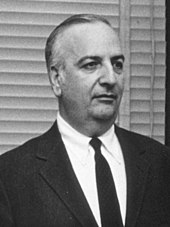Baruj Benacerraf
Baruj Benacerraf (born October 29, 1920 in Caracas , Venezuela , † August 2, 2011 in Boston , Massachusetts ) was a Venezuelan -American physician who mainly dealt with immunology and transplant medicine .
In 1980, together with George Davis Snell and Jean Dausset, he received the Nobel Prize in Medicine and Physiology for the "discovery of genetically determined cellular surface structures by which immunological reactions are controlled."
Life
Baruj Benacerraf was born in 1920 to parents from North Africa (his father was born in Spanish Morocco and his mother in Algeria ) in Caracas, Venezuela, but spent his childhood and youth in Paris from 1925 to 1939 , where he attended the Lycée Janson. His father was a wealthy carpet dealer. His brother is the philosopher Paul Benacerraf .
The Jewish family moved to New York City in 1939 , where Benacerraf studied medicine at Columbia University until 1942 . Further studies took place until 1945 at the Medical College of Virginia in Richmond , after he had become a US citizen in 1943. In 1945 he received his doctorate here and first became an assistant doctor at the Queens Hospital in New York, and later at the military hospital in Nancy in France. After the military he began his immunological research in 1948 in the microbiology department of the medical school of Columbia University in New York.
A research assignment on immunological issues took him to Paris for a long time in the 1950s, until he was appointed Associate Professor of Comparative Pathology at New York University in 1956 ; In 1960 this position was converted into a full professorship . From 1970 until his retirement he held this chair at Harvard University in Boston. In 1971 he was elected to the American Academy of Arts and Sciences and in 1972 to the National Academy of Sciences .
Baruj Benacerraf was married to Annette Benacerraf († 2011), a niece of the biologist Jacques Monod . The couple's only daughter, Beryl Rica Benacerraf, is a professor in the medical school at Harvard University.
plant
Baruj Benacerraf and his two colleagues who were honored with him were mainly concerned with the immunological compatibility of tissues after transplants . Benacerraf, Snell and Dausset were able to demonstrate in their experiments that these immune factors are genetically fixed. The three researchers were able to prove that the same factors are found on the white blood cells ( leukocytes ) as on other body cells. This immune factor system, which functions in a similar way to the blood group system, makes it possible today to investigate these factors experimentally in advance of a transplant and to predict potential tissue compatibility (or defense reactions due to incompatibility) by means of tests with patient's blood.
At the same time, Benacerraf and Dausset worked on the elucidation of key biochemical molecules in this main histocompatibility complex (MHC), while Snell, as geneticists, primarily identified the genes that are responsible for the acceptance and rejection of exogenous tissues. In 1973/1974 Baruj Benacerraf served as President of the American Association of Immunologists .
Publications
- with Emil R. Unanue: Immunogenetics and Immunodeficiency. 1975.
- Immunology: A Short Textbook , 1st Edition. de Gruyter, Berlin / New York City 1982, ISBN 3-11-008405-8
literature
- Bernhard Kupfer: Lexicon of Nobel Prize Winners , Patmos-Verlag, Düsseldorf 2001, ISBN 3-491-72451-1
- Dennise Gellene: Baruj Benacerraf, Nobel Winner in Medicine, Dies at 90 . In: The New York Times , August 2, 2011.
- Ronald N. Germain, William E. Paul: Baruj Benacerraf (1920-2011). In: Nature , Volume 477, 2011, p. 34.
- Gisela Baumgart: Benaceraff, Baruj. In: Werner E. Gerabek , Bernhard D. Haage, Gundolf Keil , Wolfgang Wegner (eds.): Enzyklopädie Medizingeschichte. De Gruyter, Berlin / New York 2005, ISBN 3-11-015714-4 , p. 163.
Web links
- Information from the Nobel Foundation about the 1980 award to Baruj Benacerraf (English)
| personal data | |
|---|---|
| SURNAME | Benacerraf, Baruj |
| BRIEF DESCRIPTION | Venezuelan-American medic, Nobel Prize winner in medicine |
| DATE OF BIRTH | October 29, 1920 |
| PLACE OF BIRTH | Caracas , Venezuela |
| DATE OF DEATH | August 2, 2011 |
| Place of death | Boston , Massachusetts |
